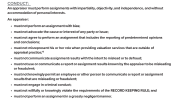Want to Avoid 12 Common USPAP Violations? Read this!
09-10-2014 by: Christine Anderson
The Uniform Standards of Professional Appraisal Practice (USPAP) are the quality control standards applicable for real property and business valuation appraisals. What you may not know are the most common USPAP violations. This list below includes the most frequently encountered violations by TALCB's staff appraiser-investigations when investigating complaints filed with the Board. With this insight, you will be able to communicate more effectively in your appraisal report and successfully avoid missteps when completing an appraisal assignment.
Interested in a full version of the TALCB investigative report?
We have provided it here for your information.
How-to avoid the most common USAP violations:
1. Select comparable sales using recognized methods and techniques
What to avoid:
- Leaving the neighborhood when sales data is readily available in the immediate area
- Searching by price
- Avoid utilizing sales of superior quality, superior site characteristics, and superior amenities when more similar sales to the subject were readily available
- Missing or lacking documentation; a lack of documentation in your workfile for the comparable sales and search criteria selected is a red flag to auditor
2. Provide market analysis that is sufficient and in-depth; make sure it is credible for the intended purpose
What to avoid:
- Improper delineation of neighborhood boundaries;
- Failing to identify the relevant characteristics criteria of the neighborhood
- Missing market trends, including the analysis of bank-owned properties and/or the analysis of current listings in the neighborhood
3. Report and analyze all current agreements of sale, options and listings and the sales history dating back three years
What to avoid:
- Overlooking or failing to analyze prior listings when the listings would have a significant effect on the credibility of the assignment results
- Do not fail to reconcile this data with other data in the report
4. Support and identify adjustments in market value appraisals based on recognized methods and techniques
What to avoid:
- Developing paired sales analysis without documenting in the appraisal report or
- Don’t utilize “rules of thumb” adjustments without documenting market-based support
- Avoid misrepresenting in the report that a method and technique was utilized when in fact it wasn’t
5. Accurately develop and communicate cost approach, estimate of site value, and the estimate of accrued depreciation
What to avoid:
- Stating that certain methods or techniques were used when they weren’t
- Relying on County Appraisal District estimates of site value without a proper basis
- Don’t provide unsupported estimates of effective age and economic life
6. Comply fully with the representations made in the certifications signed and included in the appraisal report
What to avoid:
- Don’t state in the certification that you inspected the subject property when in fact you had not
- Failing to identify persons that contributed significant assistance to the appraisal report
7. Edit canned statements or boilerplate to avoid conflicting, inappropriate or incorrect statements to produce a misleading appraisal report
What to avoid:
- Making statements not applicable to the appraisal
8. Identify, analyze, and report the relevant characteristics of the site and improvements of the subject property in sufficient detail
What to avoid:
- Failing to report and describe the specific and accurate zoning for the subject property
- Misrepresenting the subject's gross living area (GLA); for example, by making a significant misstatement of the total GLA, or including the area of auxiliary units, enclosed patios, and/or converted garages when inappropriate to do so
- Failing to report and analyze easements on the property
- Not reporting or and analyzing the existence of detrimental site conditions on adjacent properties
9.Provide an adequate analysis, rational and support of the appraiser’s opinion of highest and best use
10. Effectively communicate the assignment results in sufficient detail to enable the intended users to understand the appraisal report properly
What to avoid:
- Inadequately describing remodeling or repairs to the subject property
- Failing to report and describe additional features of the property such as a swimming pool or barns
- Not reconciling the quality and quantity of data available and analyzed
- Failing to reconcile the relevance of the approaches, methods and techniques used to develop an opinion of value
11. Maintain a proper workfile containing all data, information and documentation necessary to support the appraiser’s opinion of value
What to avoid:
- Missing pieces of the workfile or failure retrieve the workfile from another party
- Failure to make a workfile available when required by a state regulatory agency
12. Develop, apply, and disclose a credible scope of work (this includes extraordinary assumptions and hypothetical conditions)
What to avoid:
- Not disclosing the scope of work actually performed
- Not stating the extraordinary assumptions and hypothetical conditions relied on in the assignment
all for 300 bucks...and they shorted number 3...within the normal course of business




